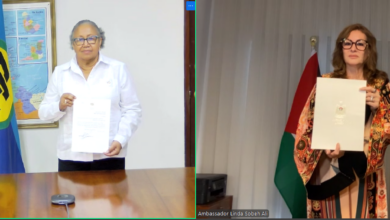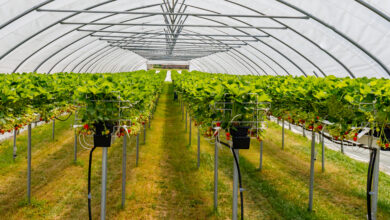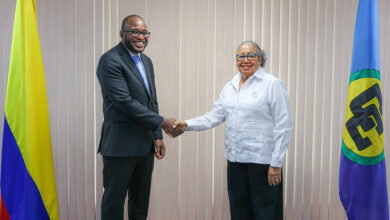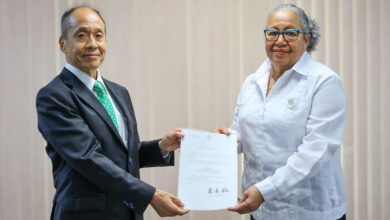Ladies and Gentlemen, I am indeed honoured to have the privilege to address my Fellow Heads in the idyllic isle of Canouan, a special part of St Vincent and the Grenadines.
As you know, we have a heavy Agenda before us. The demands of fighting for our space as small and very vulnerable island economies in the context of globalization and liberalization and Harmful Tax weigh heavy on our deliberations. Liberalization and globalization advocate that competition in trade is good for efficiency, growth and development; but competition in taxes is harmful and undermining. We have to find the point of truth and reconciliation.
And whatever we decide here, must be done in the supreme interest of our people.
Mr. Chairman, we, in CARICOM, have been building structures to achieve social and human development. We have been doing so on the inherent assumption that the underlying societal foundations and civil structures are in place and functioning in a manner to support these efforts. We have also assumed that all social partners would adhere to the same rules of societal behaviour.
Mr. Chairman, economic and social development cannot be fully achieved, or maintained without harmony and stability in the society. They are prerequisites to growth and social development.
We in Grenada know the cost of abandoning social harmony; we have felt the harsh consequences of short-circuiting the democratic process; we have felt the painful results of political impatience; we know the bloody price of solving political problems by the gun rather than by dialogue or by the ballot.
Today, Grenada is still paying the painful price of that period in our history. In several spheres of national life, the scars of that period are still visible. Mr. Chairman, the Grenada Revolution is a period of History, which we in Grenada, which we in the Caribbean must never forget.
Today, we live in new circumstances. Globalization and liberalization demand of us political conduct, social behaviours, and economic operations higher in quality than those of the past. Today, we have to be competitive. We have to be comparable with the best in the world. Today, our workers have to compete for jobs, not so much with one another, but with workers worldwide, as jobs move freely around the globe.
In this new global environment, the demands on us are for higher levels of political judgment, greater sense of social responsibility, superior civil behaviour and more mature adherence to the principles and the spirit of democracy.
The actions and behaviours of governments and political leaders, the conduct of social and trade unions leaders, the operations of private business must adjust to the new circumstances, the new insights and the new information. The street is no longer the acceptable place for civil society to resolve its differences.
Mr. Chairman, CARICOM countries have more than embraced the principles and objectives of good governance. We are developing the civil infrastructure and the environment. But we have to also address the policies of Government, the efficiency of local institutions, and the quality of the process of dispute resolution. Peaceful resolution of social conflicts is essential to the prospects for investments, economic growth and employment creation.
The question is whether inclusiveness, active and meaningful participation in governance can effectively take place in the context of the present constitutional framework. (I beg the question).
Notwithstanding my Party’s success in winning all 15 parliamentary Seats at the General Elections in Grenada, the wisdom of having greater voice and participation of the Civil Society in governance has become even more emphatic. We must respond, and do so quickly.
On the other hand, if Civil Society is to take up its role as a partner in governance, then
- That role cannot be role of subverting the legitimately elected Government;
- That role cannot be a role contaminating the democratic process;
- That role cannot be a role of bringing down the properly elected government by force or threat to the lives of the citizens; or by creating a situation of duress;
Yet, Mr. Chairman, Government needs remove possible operational and constitutional basis for such behaviour.
Mr. Chairman, our countries are sitting on a fragile base. It does not take much for us to be marginalized internationally. For example, Grenada’s economic growth was 7.9% in 1998 and 8.5% in 1999. Reasonable by any standards! But, it does not take much to destroy our hard earned progress, or to injure the good name of our Country, and the Caribbean or to erase much of the goodwill in tourism and among investors, which we have built up over the years.
We acknowledge that it is time for the Caribbean Community to formally reconsider the matter of the Civil Society, good governance within the Community, dispute settlement in the spheres of the Civil Society especially industrial disputes.
I therefore look forward to the proposed Conference early in 2001 with representatives of the Civil Society, including Labour, Youth, religious organizations, NGOs, private sector, and others, to discuss the Way Forward in terms of participation, governance and other aspects of priority development of the peoples of the Region.
Mr. Chairman, in the field of Science and Technology, there is urgent need to strengthen our regional institutional capacity. Mindful of our limited financial and human resources, our focus must be on rationalization of what we already have and targeted and optimal use of those limited resources. Operationally, we must focus on our priority sectors. In my brief intervention under the Agenda Item Science and Technology in Sustainable Development, I will propose for you consideration: Food Security and Agriculture; Small and Micro Enterprises; Marine Resources Management, and Education.
Mr. Chairman, I cannot end without a brief word about our host, Sir James Mitchell.
I have known Sir James since I first visited St Vincent as captain of a Grenada National Cricket Team in 1972 when Sir James was Premier. Our passion for Cricket, our love for the peoples of the Caribbean led to our first encounter. That seems like light years ago.
We have talked about our experiences, about our countries, about the Caribbean, about ourselves, world affairs, and our problems. Sir James is therefore not just the Prime Minister of St Vincent and the Grenadines. He is, and always has been, a genuine Caribbean friend.
I recall that when a former Prime Minister of Grenada was executed, Sir James was one of the first to call for intervention. Over the years, his wisdom has grown and his value to the Caribbean has heightened.
Colleagues, we all know the tenuous nature of our profession. Sir James understood that better than most. Whenever there was a problem in Grenada, Sir James was always among the first to call, to show concern, to offer advice and assistance.
The personal touch with which he operates, and his sensitivity to you as a person, are rare, but valued attributes. I recall that even when I was out of government, in Opposition, Sir James would still seek me out with a word of wisdom, comfort and direction. In government or out of government he remained a genuine friend.
I, Mr. Chairman, was a beneficiary of his understanding and his wisdom, his personal touch, his deep sensitivity and his caring.
And I know that there are many here who will attest that.
Sir James, Thank you. Best Wishes! Good Health! Peace and Happiness! Your friendship will always be cherished.
Ladies and Gentlemen, Fellow Heads, Thank you!





